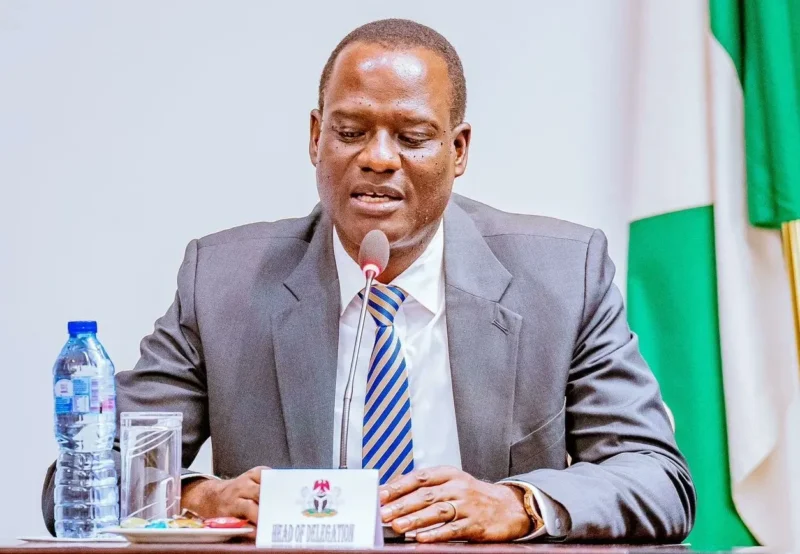The new tax regime, expected to come into force on 1 January 2026, will give multinationals and local companies a five‑per‑cent annual tax credit, the chairman of the Presidential Fiscal Policy and Tax Reform Committee, Taiwo Oyedele, has said.
The policy includes a five‑per‑cent annual tax credit for investments in eligible priority sectors; top‑up tax exemption thresholds of 50 billion for local firms and €750 million for multinational companies; and an option for businesses involved in foreign‑currency transactions to remit taxes in naira at the official exchange rate.
The reform, described by policy experts as one of the most ambitious in decades, is designed to “simplify taxation, broaden the tax base, and boost revenue generation” without stifling business growth, particularly among micro, small and medium‑sized enterprises (MSMEs).
With MSMEs contributing “over 48 per cent of Nigeria’s GDP” and employing more than “80 per cent of the workforce”, the reform’s impact on this segment is expected to be profound. Analysts say that if properly implemented, it could reshape compliance culture, promote formalisation, and drive inclusive growth.
Speaking in an interview in Lagos, Taiwo Oyedele said the reform marks a significant turning‑point in how the Nigerian government views taxation, not merely as a revenue source but as a “social contract” between citizens and the state.
“Taxation is not just a fiscal tool; it’s a foundational pillar of the social contract between citizens and government. When citizens see transparency and accountability in taxes, compliance naturally follows,” Oyedele said, emphasising the need for stronger tax literacy.
Oyedele described Nigeria’s current public understanding of taxation as “near zero” and urged the government to intensify education and advocacy among “corporate entities, SMEs, and the informal sector” to improve compliance and trust.
Under the new framework, companies with an annual turnover below ₦100 million and fixed assets under ₦250 million will be fully exempted from corporate tax. This move aims to ease the compliance burden on micro and small businesses.
The corporate tax rate for larger corporations will drop from 30 per cent to 25 per cent, pending presidential approval based on recommendations by the National Economic Council.
Oyedele noted that these adjustments are designed to create a fairer, more straightforward, and more transparent system that rewards compliance and investment, while reducing the multiplicity of taxes that have long plagued Nigerian businesses.
He also drew attention to gaps in fiscal administration, citing the continued use of outdated withholding‑tax systems and weak expenditure‑tracking mechanisms.
He advocated the adoption of corporate‑governance codes in the public sector to institutionalise fiscal discipline, stating that the government needs to be governed by the same principles it demands from business: transparency, accountability, and value for money.
He urged stronger public‑expenditure tracking and independent audits to prevent financial leakages.
Meanwhile, the Association of Small Business Owners of Nigeria (ASBON) has stated that for the reforms to succeed, the government must also tackle the issue of multiple and informal taxation, especially at the local government level.
It called for council taxes to be eliminated to allow the new tax reforms to succeed.
ASBON recognised the benefits of the new tax regime for smaller businesses but criticised insufficient stakeholder engagement and potential burdens on some enterprises.
Speaking in a media chat, ASBON president, Dr Femi Egbesola, criticised the federal government for inadequate engagement with SMEs on policy matters, noting that the new tax reforms should address bureaucratic hurdles.
ASBON leaders highlighted challenges in Nigeria’s tax system, such as the multiplicity of taxes, complexity and poor administration, which may hinder business operations.
He warned that, despite reforms, macro‑economic instability and aspects like the revised Capital Gains Tax could increase poverty and non‑compliance.
ASBON acknowledged benefits such as income‑tax exemption for small businesses with turnover up to ₦50 million, a consolidated four‑per‑cent development levy, and expanded zero‑rated VAT on essential items.
The ASBON boss recommended a collaborative approach to tax policy, advocating for inclusive implementation, simplified processes, and a supportive business environment.
ASBON maintained cautious optimism, recognising beneficial provisions in new tax policies while urging better government collaboration and focus on small businesses’ economic realities.
The Centre for the Promotion of Private Enterprise (CPPE) and the Civil Society Legislative Advocacy Centre (CISLAC) have both commended the reforms, describing them as a bold step toward fiscal modernisation and fairness.
Chairman of CPPE, Dr Muda Yusuf, said the reforms would make Nigeria’s tax system “more equitable, efficient, and transparent”.
“One of the biggest gains is the reduction in the multiplicity of taxes, which has long frustrated Nigerian businesses,” Yusuf said. “Several redundant levies have been removed, while new incentives have been introduced to attract investment and stimulate production.”
He also pointed out that the personal income tax threshold has been expanded, exempting low‑income earners from PAYE obligations — a move he believes will ease the financial pressure on households and small businesses.
CISLAC executive director Auwal Musa Rafsanjani urged the government to ensure transparency, accountability, and fairness in implementing the reforms.
He warned that the success of the new tax laws will depend on whether revenues are used for the public good rather than lost through corruption or administrative loopholes.
“Nigeria is losing significant revenue to tax evasion, avoidance, and weak enforcement,” Rafsanjani said. “We also see multiple agencies competing as tax collectors, leading to exploitation and dual taxation. A unified, transparent system is urgently needed.”
He added that women and vulnerable groups often endure unfair taxation, stressing that a fairer regime would help correct such social imbalances.
Rafsanjani called on the National Assembly, particularly the Senate, to deepen public sensitisation, noting that many Nigerians still lack adequate understanding of the new laws.
Experts agree that while the 2026 tax reform will expand Nigeria’s fiscal base, its success will depend on public trust, policy consistency, and accountable governance.
As Nigeria moves toward implementation, Oyedele’s message remains clear: “Taxation is a shared responsibility, a social contract that can only work when both government and citizens hold up their ends of the bargain.”








